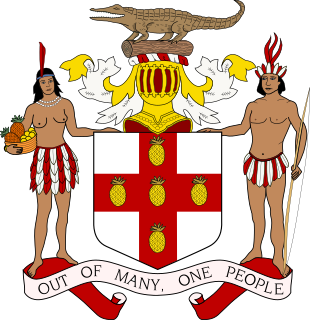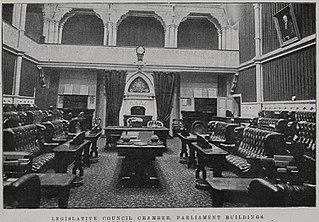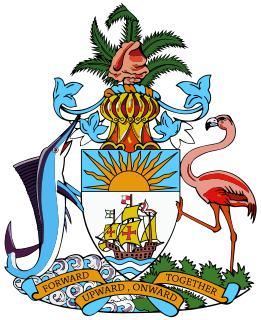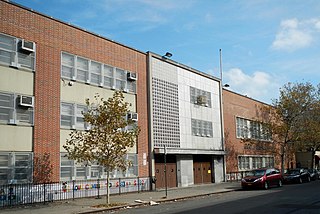
The Governor of Michigan is the chief executive of the U.S. state of Michigan. The current governor is Gretchen Whitmer, a member of the Democratic Party, who was inaugurated on January 1, 2019, as the state's 49th governor. She is eligible for a second term under Michigan's term limits, which limit a governor to only two, four-year terms.

Politics in Jamaica takes place in the framework of a representative parliamentary democratic constitutional monarchy. The 1962 Constitution of Jamaica established a parliamentary system whose political and legal traditions closely follow those of the United Kingdom. As the head of state, Queen Elizabeth II - on the advice of the Prime Minister of Jamaica - appoints a governor-general as her representative in Jamaica. The governor-general has a largely ceremonial role. Jamaica constitutes an independent Commonwealth realm.

The Parliament of Canada is the federal legislature of Canada, seated at Parliament Hill in Ottawa, the national capital. The body consists of the Canadian monarch, represented by a viceroy, the Governor General; an upper house, the Senate; and a lower house, the House of Commons. Each element has its own officers and organization. By constitutional convention, the House of Commons is dominant, with the Senate and monarch rarely opposing its will. The Senate reviews legislation from a less partisan standpoint and the monarch or viceroy provides royal assent to make bills into law.

The Constitution of the Irish Free State was adopted by Act of Dáil Éireann sitting as a constituent assembly on 25 October 1922. In accordance with Article 83 of the Constitution, the Irish Free State Constitution Act 1922 of the British Parliament, which came into effect upon receiving the royal assent on 5 December 1922, provided that the Constitution would come into effect upon the issue of a Royal Proclamation, which was done on 6 December 1922. In 1937 the Constitution of the Irish Free State was replaced by the modern Constitution of Ireland following a referendum.

The Legislative Council of New Zealand existed from 1841 until 1951. When New Zealand became a colony in 1841 the Legislative Council was established as the country's first legislature; it was reconstituted as the upper house of a bicameral legislature when New Zealand became self-governing in 1852.

The Senate is the Upper House of the bicameral legislature the Parliament of Barbados. The Senate is accorded legitimacy by Chapter V of the Constitution of Barbados. It is the smaller of the two chambers and also includes Elizabeth II, Queen of Barbados. The Senate was established in 1964 to replace a prior body known as the Legislative Council. Besides creating and reviewing Barbadian legislation, the Senate generally reviews approved legislation originating from the House of Assembly. One main constraint on the Senate is that it cannot author monetary or budget-related bills. Most of the non-political appointees to the Senate have been selected by the Governor General from civil society organisations, labour collectives and public associations in Barbados.

The Constitution of Haiti was modeled after the constitutions of the United States and France. The document was approved by Parliament in March 2011 and came into effect on June 20, 2012.

The Supreme Federal Court is the supreme court of Brazil, serving primarily as the Constitutional Court of the country. It is the highest court of law in Brazil for constitutional issues and its rulings cannot be appealed. On questions involving exclusively non-constitutional issues, regarding federal laws, the highest court is, by rule, the Superior Court of Justice.

The Parliament of The Bahamas is the bicameral national parliament of Commonwealth of The Bahamas. The parliament is formally made up of the Queen, an appointed Senate, and an elected House of Assembly. It currently sits at Nassau, the national capital.

The Senate is the upper house of the National Assembly of Thailand,. In accordance with the 2017 Constitution of Thailand, the Senate is a non-partisan legislative chamber, composed of 250 members. All 250 Senators are appointed by the Royal Thai Military. The Senate operates under fixed terms of six years.

The Senate of Bermuda is the upper house of the Parliament of Bermuda, the other being the House of Assembly. The Senate consists of eleven members appointed by the Governor for five-year terms — five Senators are nominated by the Premier, three by the Leader of the Opposition, and three appointed at the discretion of the Governor. Of the three appointed by the Governor, the Senate elects one to serve as the President, and another to serve as the Vice President.

The government of the U.S. State of Oklahoma, established by the Oklahoma Constitution, is a republican democracy modeled after the federal government of the United States. The state government has three branches: the executive, legislative, and judicial. Through a system of separation of powers or "checks and balances," each of these branches has some authority to act on its own, some authority to regulate the other two branches, and has some of its own authority, in turn, regulated by the other branches.

Luis Muñoz Rivera (1916–2006) was a senator of Puerto Rico and the last surviving delegate of Puerto Rico's Constitutional Convention, which met in 1951 and 1952.
The Massachusetts Provincial Congress (1774–1780) was a provisional government created in the Province of Massachusetts Bay early in the American Revolution. Based on the terms of the colonial charter, it exercised de facto control over the rebellious portions of the province, and after the British withdrawal from Boston in March 1776, the entire province. When Massachusetts declared its independence in 1776, the Congress continued to govern under this arrangement for several years. Increasing calls for constitutional change led to a failed proposal for a constitution produced by the Congress in 1778, and then a successful constitutional convention that produced a constitution for the state in 1780. The Provincial Congress came to an end with elections in October 1780.

The Greek Senate was the upper chamber of the parliament in Greece, extant several times in the country's history.

Proposition 1F of 2009 was a measure approved by California voters relating to the salaries of state officers. It was an amendment of the Constitution of California prohibiting pay raises for members of the State Legislature, the Governor, and other state officials during deficit years. It was proposed by the legislature and approved in a referendum held as part of the May 19, 2009 special election ballot, in which the California electorate also voted on five other propositions.
The Cabinet of Puerto Rico is the cabinet of the government of Puerto Rico and is composed of the most senior appointed officers of the executive branch of the government of Puerto Rico, who are generally the heads of the executive departments —known as the Council of Secretaries— and other officers at the same bureaucratic level—known as the Cabinet-level officers.
Maite Oronoz Rodríguez is a Puerto Rican jurist and Chief Justice of the Supreme Court of Puerto Rico. Oronoz Rodríguez is the fifth woman to serve on Puerto Rico's highest court. She is also Puerto Rico's first openly gay chief justice and, as such, the first openly gay chief justice in U.S. history. She is also the third woman to preside the Supreme Court of Puerto Rico and the youngest person to do so.

















